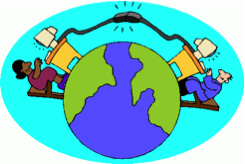By Jessica Clair
Consider a billboard.
Try to picture the ad that immediately comes to your mind. It’s most likely one you pass on a regular basis. It probably has a catchy phrase or an eye-catching image and not much else. For me, I always picture the billboard that I pass every day going home from work. In big, bold letters it says:
YOUR WIFE IS HOT!
Smaller, beneath this, it says:
Along with this smaller phrase are the name and phone number of a local heating and air-conditioning company.
This billboard is an effective advertisement because it catches your attention as you’re zipping past on the highway and engages you enough to read further—it convinces you to engage long enough to also see the important, but seemingly boring, text below it.
Writing anything for the digital sphere is a lot like designing a billboard. Your reader is zipping past with a lot of other noise vying for their attention. Unlike when reading in print, readers in the digital world can rapidly move from place to place, clicking from one thing to the next the minute they get bored.
So why should they care about your advertisement, your company, your blog, social media posting, etc?
The answer is they won’t care at first. You have to draw them in to care by first grabbing them with a fun, catchy, intriguing, confusing, even scandalous title. Think about the links that draw you in when scrolling through your Facebook news feed. BuzzFeed has a knack for catching my eye because they have articles with headlines like “We Can Tell Where You Last Had Sex” or “Here’s How to Get Free Tickets from Ticketmaster.”
These titles work on many levels. They are, first and foremost, eye-catching. Words like “Free” and “Sex” catch our eye because they are things we all in one way or another desire, have ideas about, are curious about, or have an interest in.
They also work well because they are straight forward enough that you instantly know your level of interest in the link, while leaving you questioning enough to still need to click for more information.
If you type the words “your wife is hot” into a Google search, one of the top search suggestions it gives is “your wife is hot billboard.” That means that this phrase is well-known enough in connection to advertising that it beats out countless other phrases that people could be searching.
Your headlines need to do the same.


